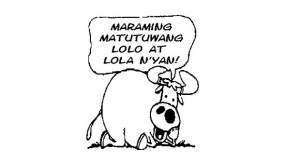Gov’t ID enough to enjoy seniors’ perks

However, they must present any government-issued ID listed in the implementing rules and regulations (IRR) of the Expanded Senior Citizens Act of 2010, or Republic Act No. 9994.
The Department of Social Welfare and Development (DSWD) made this clear following complaints that establishments give discounts due senior citizens only if they present Osca-issued IDs.
Social Welfare Secretary Dinky Soliman said the nonpresentation of a senior citizen ID was not a ground for withholding the discount privileges.
Other government-issued identification documents, such as a driver’s license, voter’s ID, Social Security System (SSS) or Government Service Insurance System (GSIS) ID, Professional Regulation Commission card or postal ID that show a senior citizen’s age and/or birth date, can be used, according to Soliman.
Citizenship, residency
She said the elderly must be able to prove their Filipino citizenship and actual residency in the country, hence the need to present other identification documents.
The DSWD said the National Coordinating and Monitoring Board (NCMB), an interagency committee chaired by the DSWD and tasked with monitoring the implementation of the law, stood by its previous policy of giving premium, as much as possible, to the Osca-issued ID cards, as provided under Rule IV, Article 6 of the implementing rules.
The provision was included to prevent abuse of the discount privileges and as a means to monitor the senior citizen population benefiting from the law.
There were some 5.905 million senior citizens in the country in 2012. The number is expected to soar to 23.633 million in 2050, according to the United Nations.
Benefits
Under the law, senior citizens shall be entitled to the following:
— Twenty-percent discount and exemption from the value-added tax, if applicable, on the sale of goods and services.
— Exemption from the payment of individual income taxes of those considered minimum wage earners in accordance with Republic Act No. 9504.
— Minimum discount of five percent on water and electricity, provided that the individual meters for the utilities are in the name of the senior citizen of the household and that the monthly consumption does not exceed 100 kilowatts per hour and 30 cubic meters of water.
— Exemption from training fees for socioeconomic programs.
— Free medical and dental services, diagnostic and laboratory fees, such as X-rays, computerized tomography scans and blood tests, in all government facilities, subject to the guidelines to be issued by the Department of Health (DOH) in coordination with the Philippine Health Insurance Corp.
— Free vaccination by the DOH against the influenza virus and pneumococcal disease for indigent patients.
— Educational assistance to senior citizens for post-secondary, tertiary, post-tertiary, vocational and technical education, as well as short-term courses for retooling to qualified senior citizens. These include support for books, learning materials and uniform allowances to the extent feasible, provided that senior citizens meet minimum admission requirements.
— Benefits and privileges given by the GSIS, SSS and Home Development Mutual (Pag-Ibig) Fund, as the case may be, as enjoyed by those in actual service.
— Retirement benefits of retirees shall be regularly reviewed to ensure their continuing responsiveness and sustainability, and, to the extent practicable and feasible, shall be upgraded to be at par with the current scale enjoyed by those in actual service.
— Discounts in special programs on the purchase of basic commodities, subject to the guidelines to be issued by the Department of Trade and Industry (DTI) and the Department of Agriculture.
— Provision of express lanes for senior citizens in all commercial and government establishments.
— Death benefit assistance of at least P2,000 to be given to the nearest surviving relative of a deceased senior citizen.
General rule
Reiterating the agreements reached by various stakeholders during the drafting of the IRR in 2010, the DSWD said the general rule was that the elderly should use Osca-issued ID cards so that they could avail themselves of the benefits.
However, in case the senior citizen inadvertently fails to present the Osca ID but is able to show another government-issued ID, businesses must still grant the discount privilege, especially for purchases of basic necessities, the DSWD added.
The member agencies of the NCMB are the Department of the Interior and Local Government, DOH, Department of Justice and DTI-Bureau of Trade Regulation and Consumer Protection, as well as nongovernment organizations advocating senior citizens’ welfare, such as the Federation of Senior Citizens Association of the Philippines, Coalition of Services for the Elderly, Alliance of Retired Postal Employees and Senior Citizens, Lousie de Marillac Foundation and St. Vincent Foundation for Children and Aging.